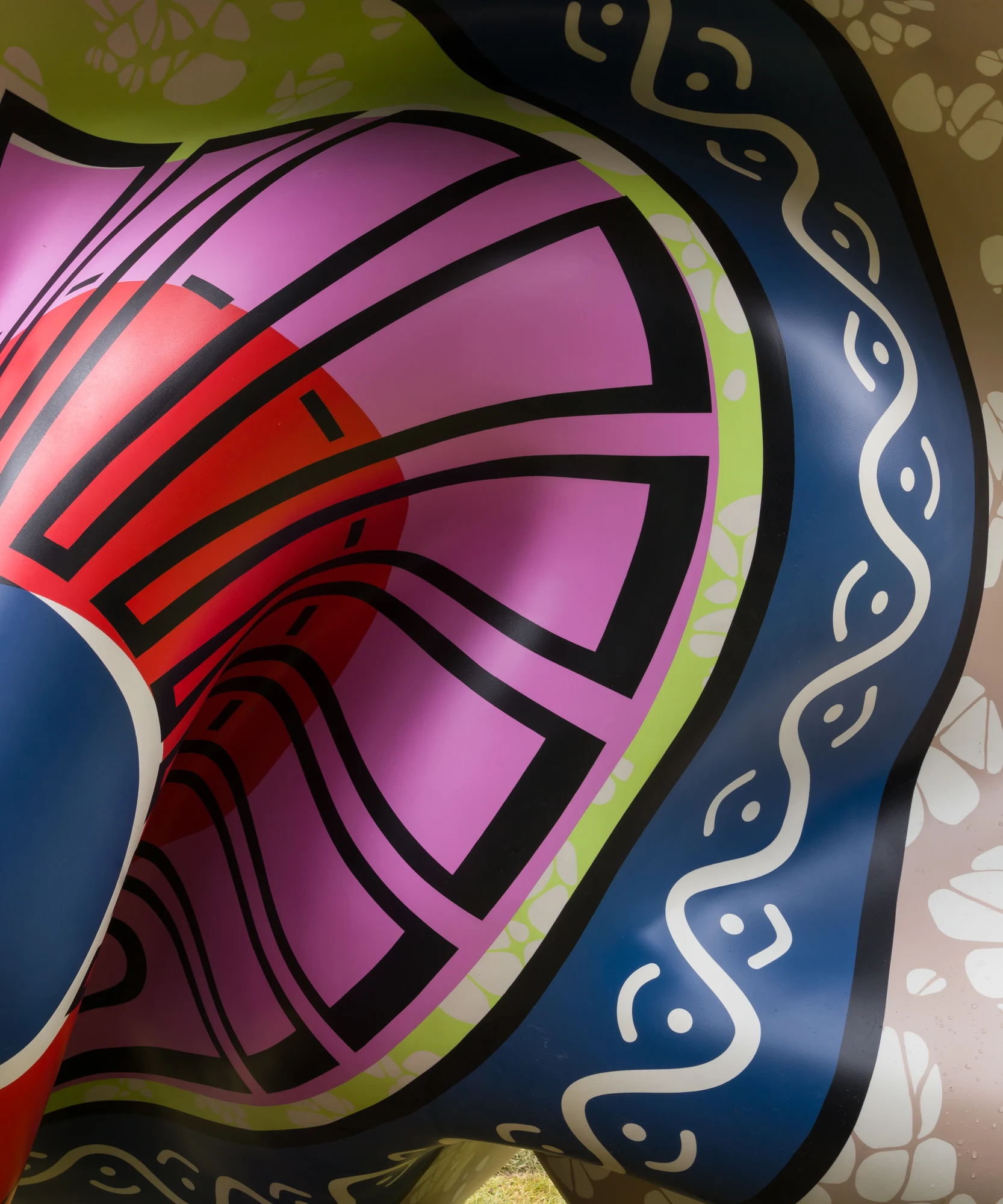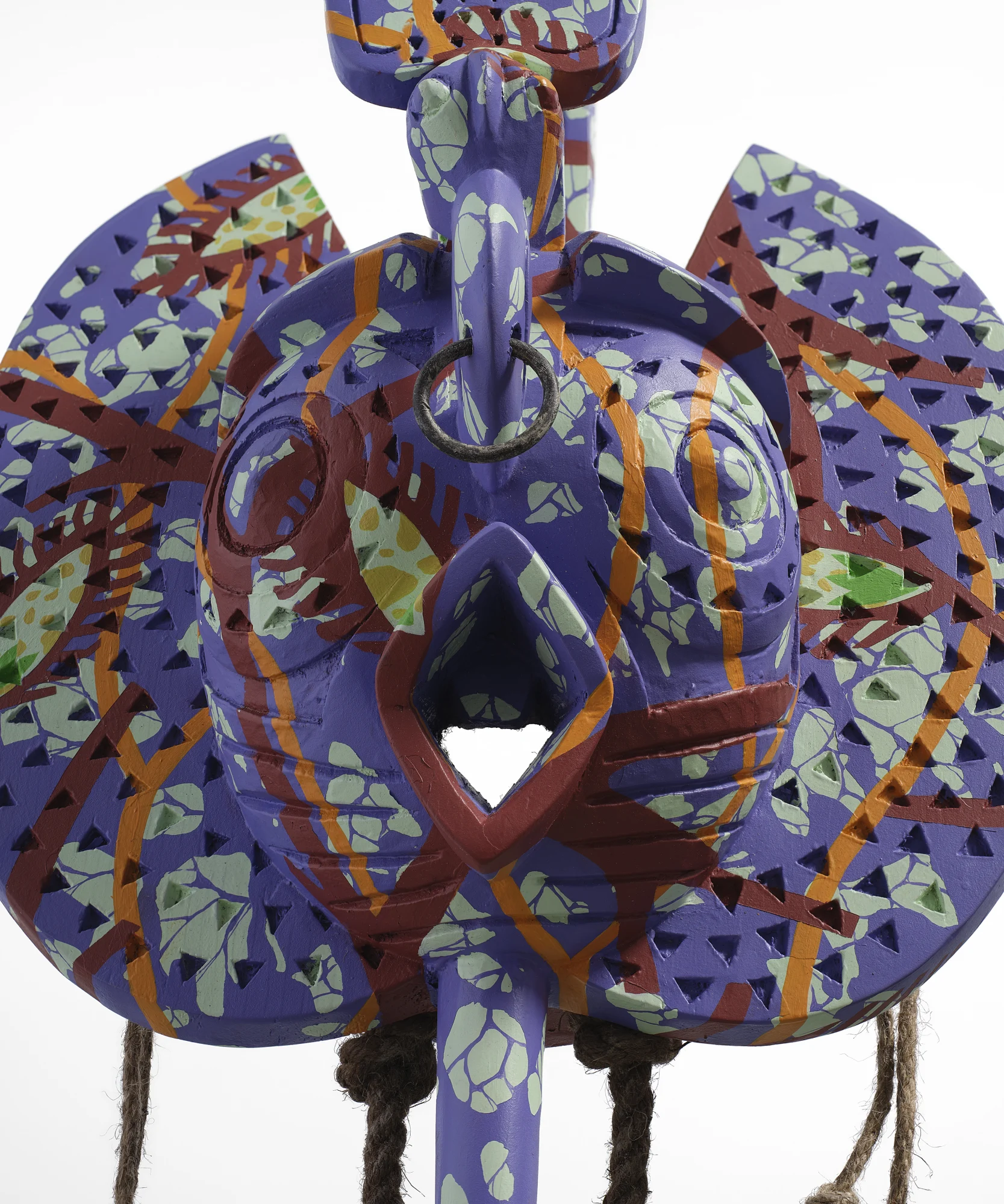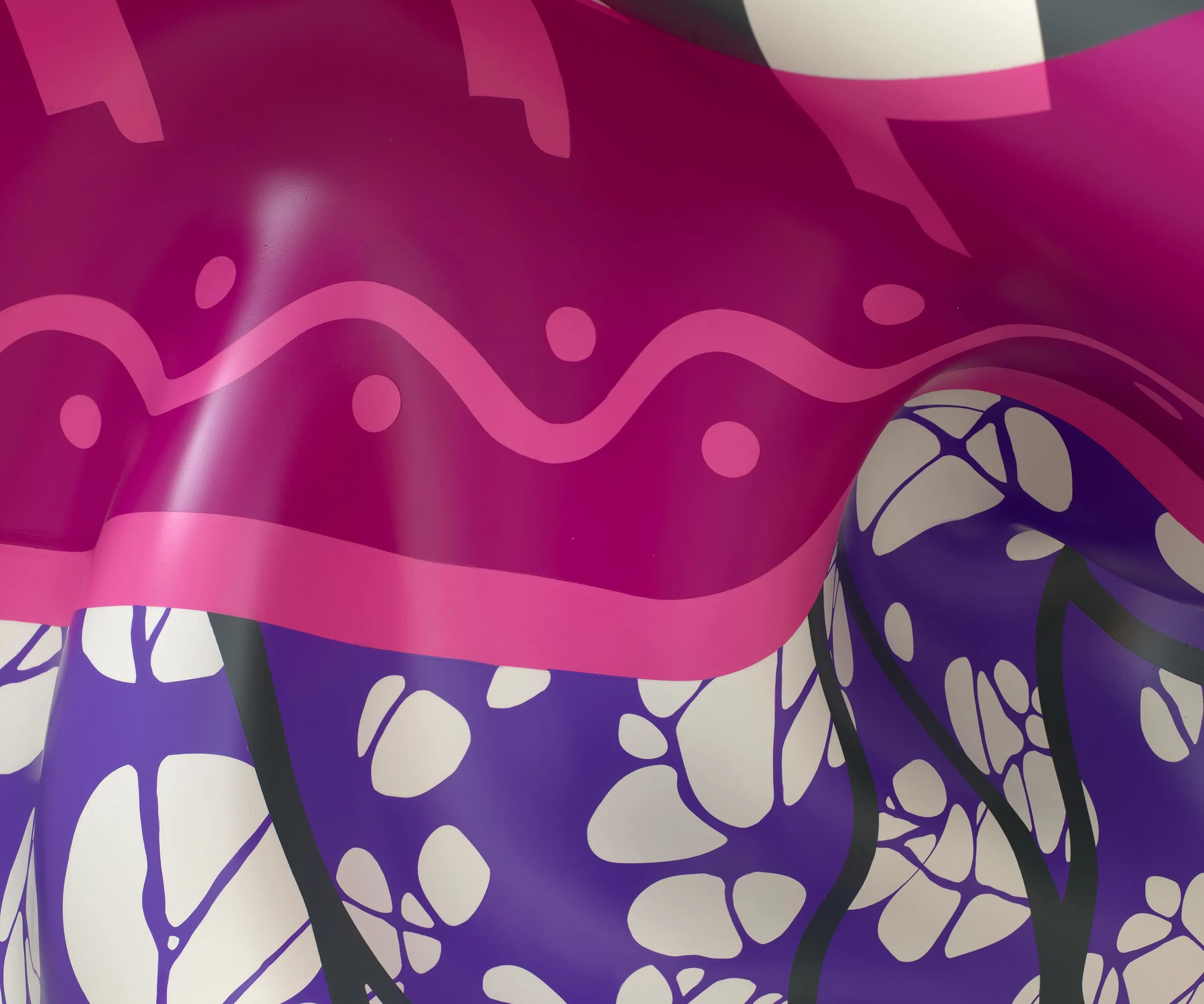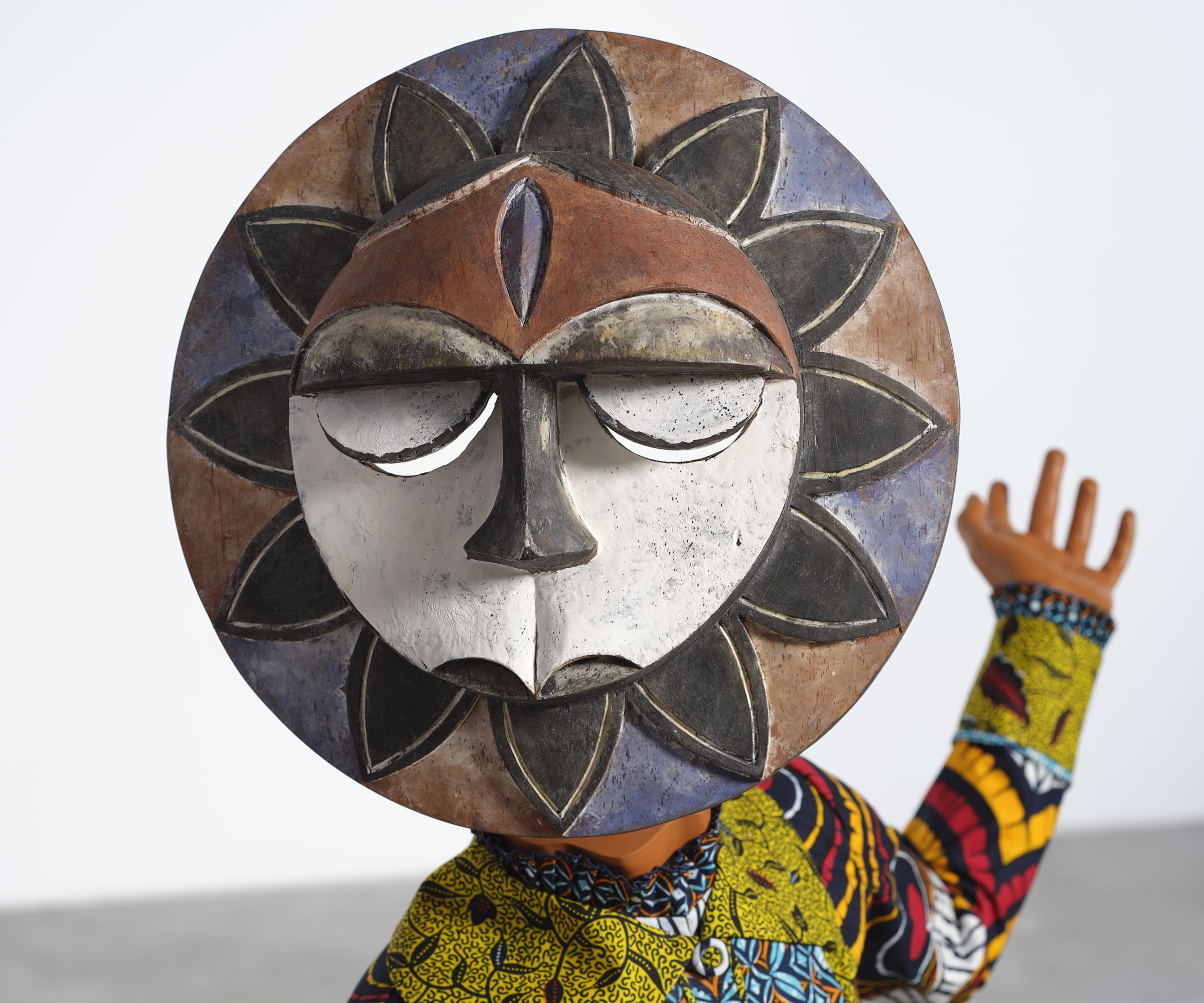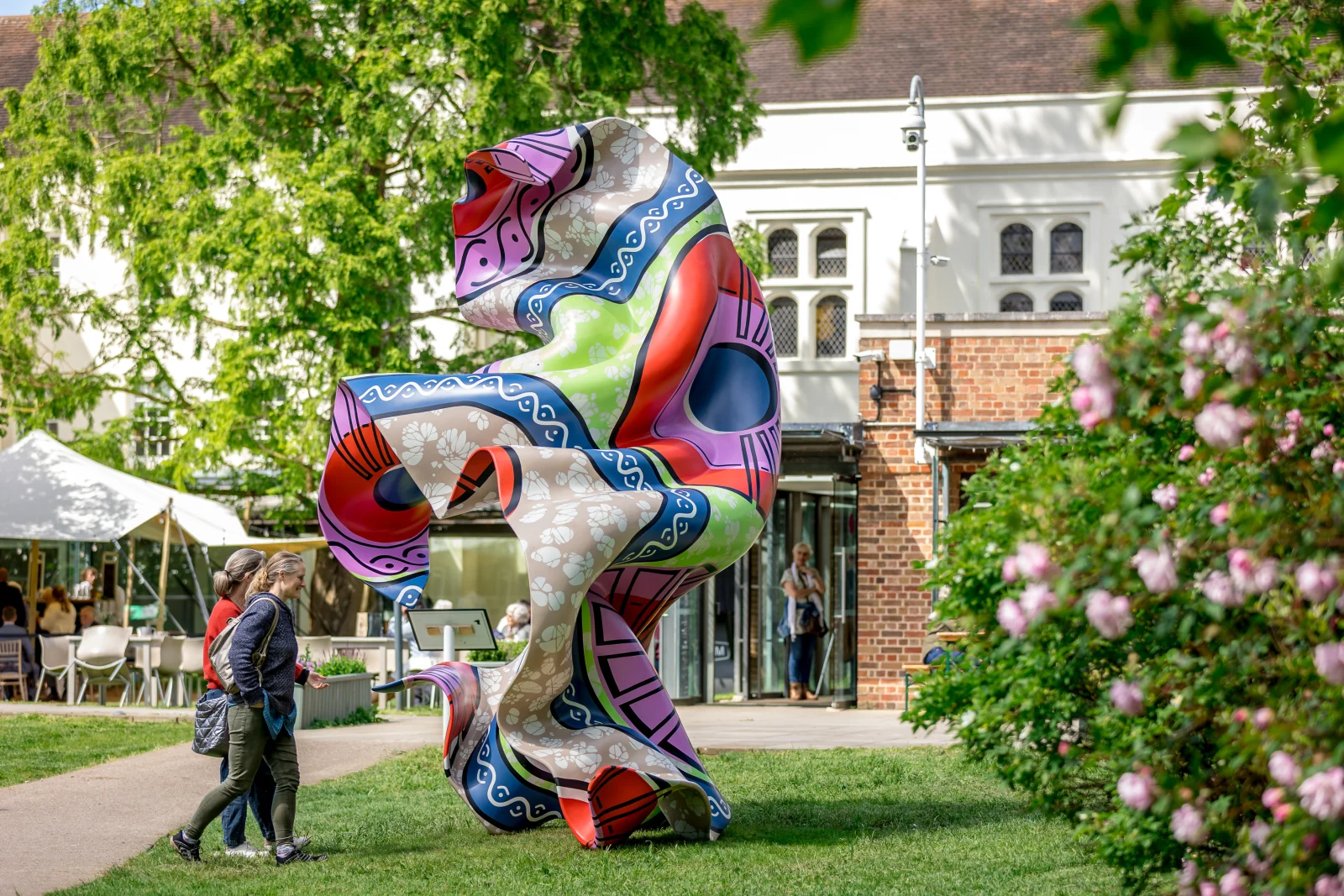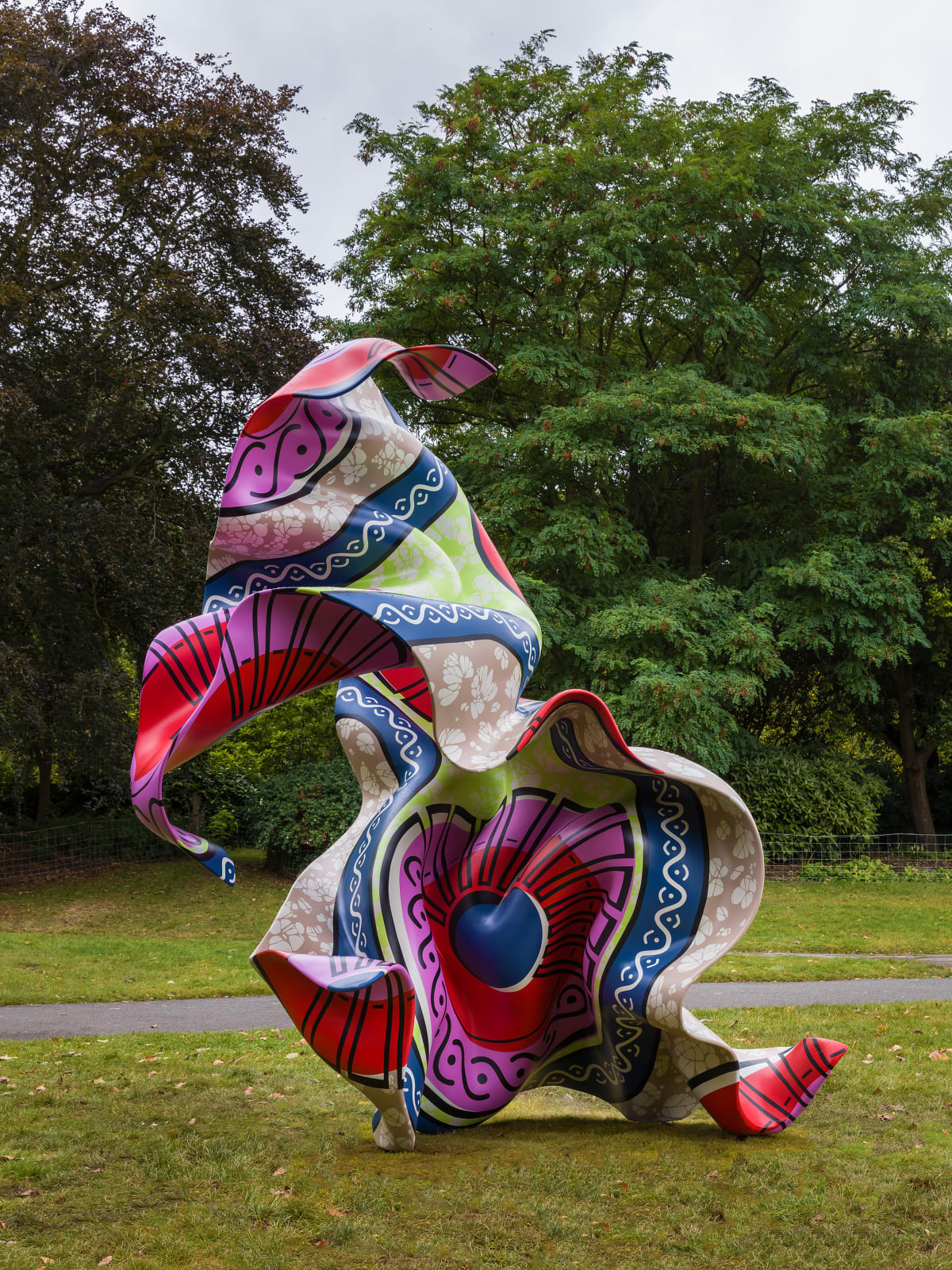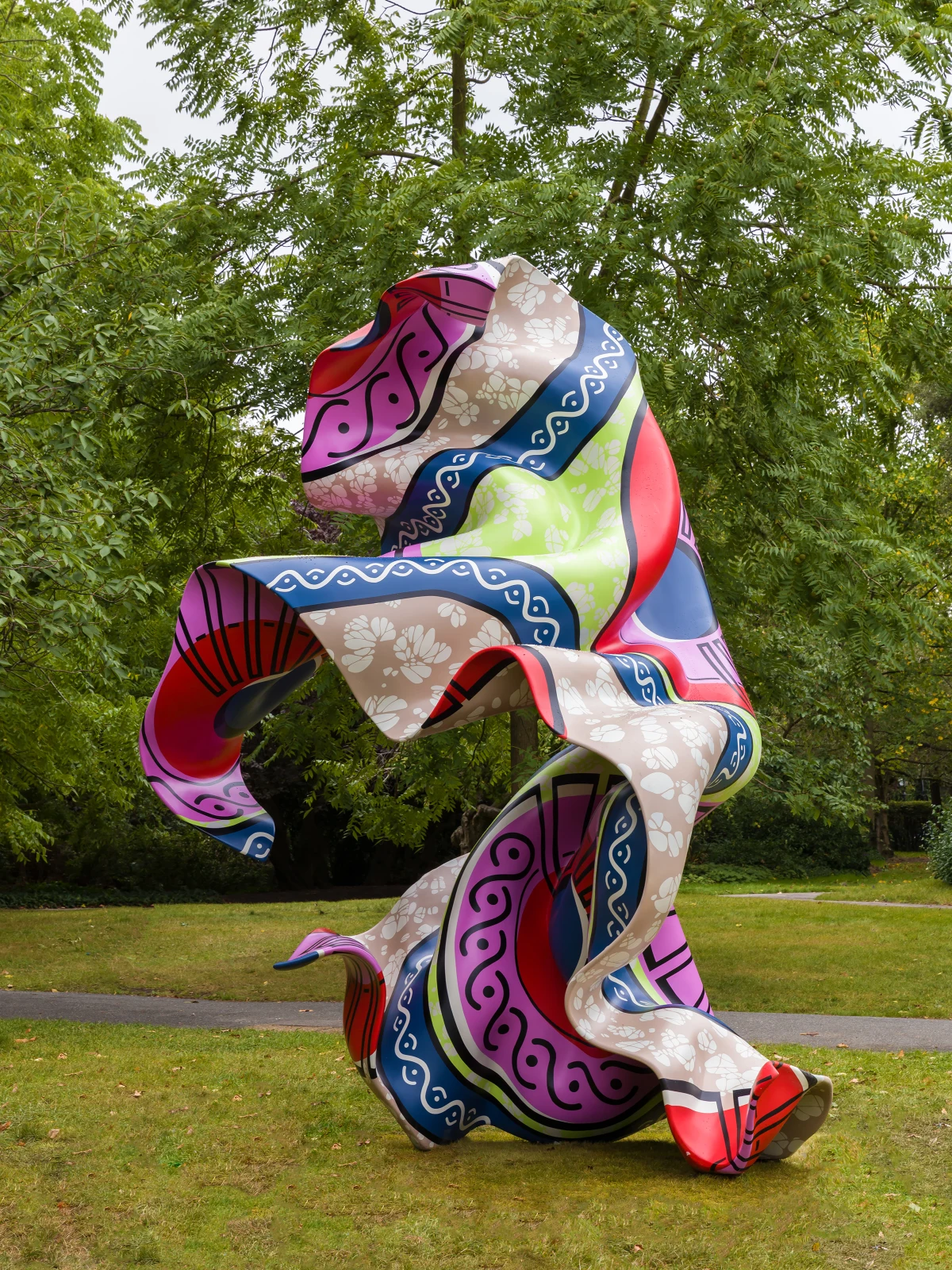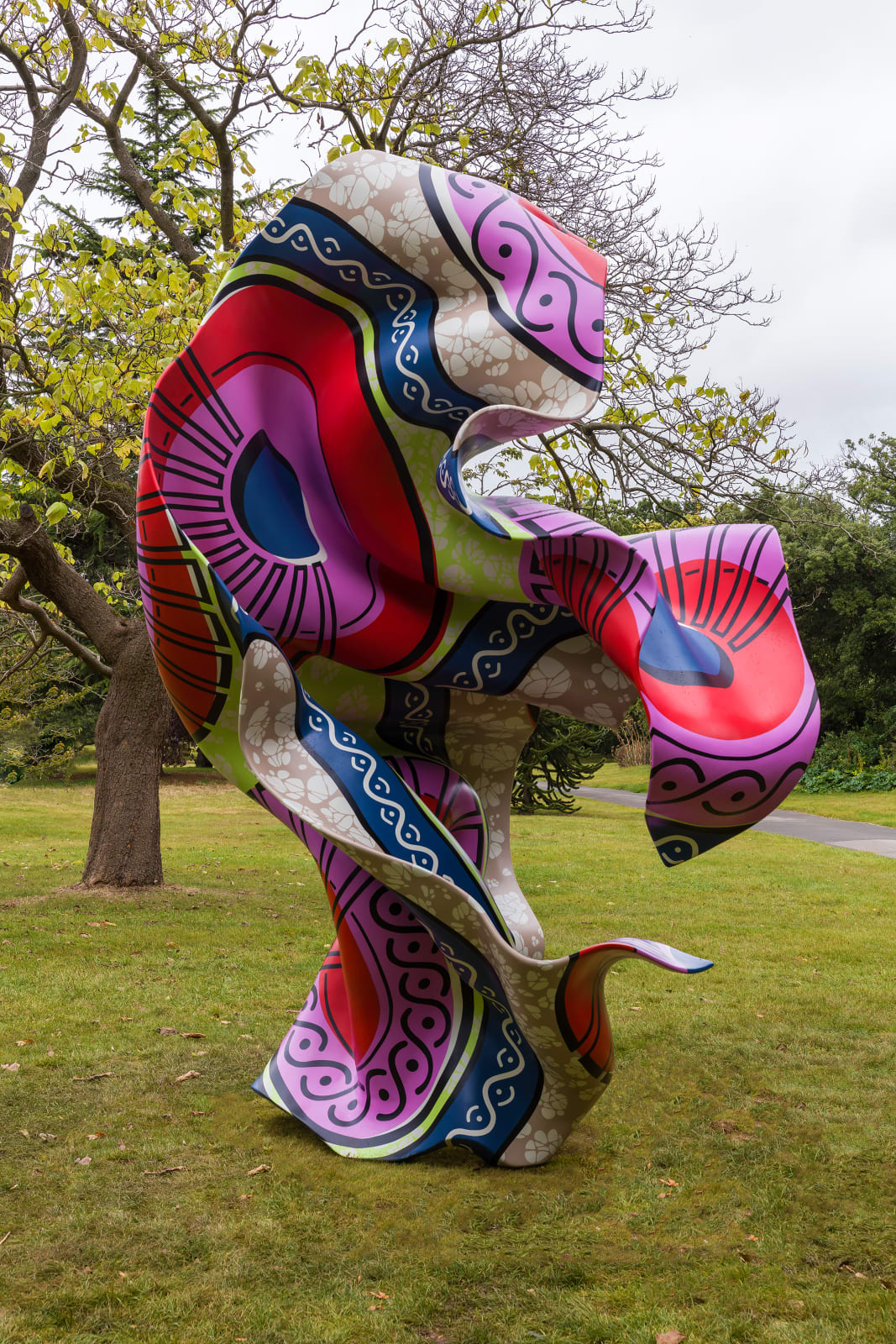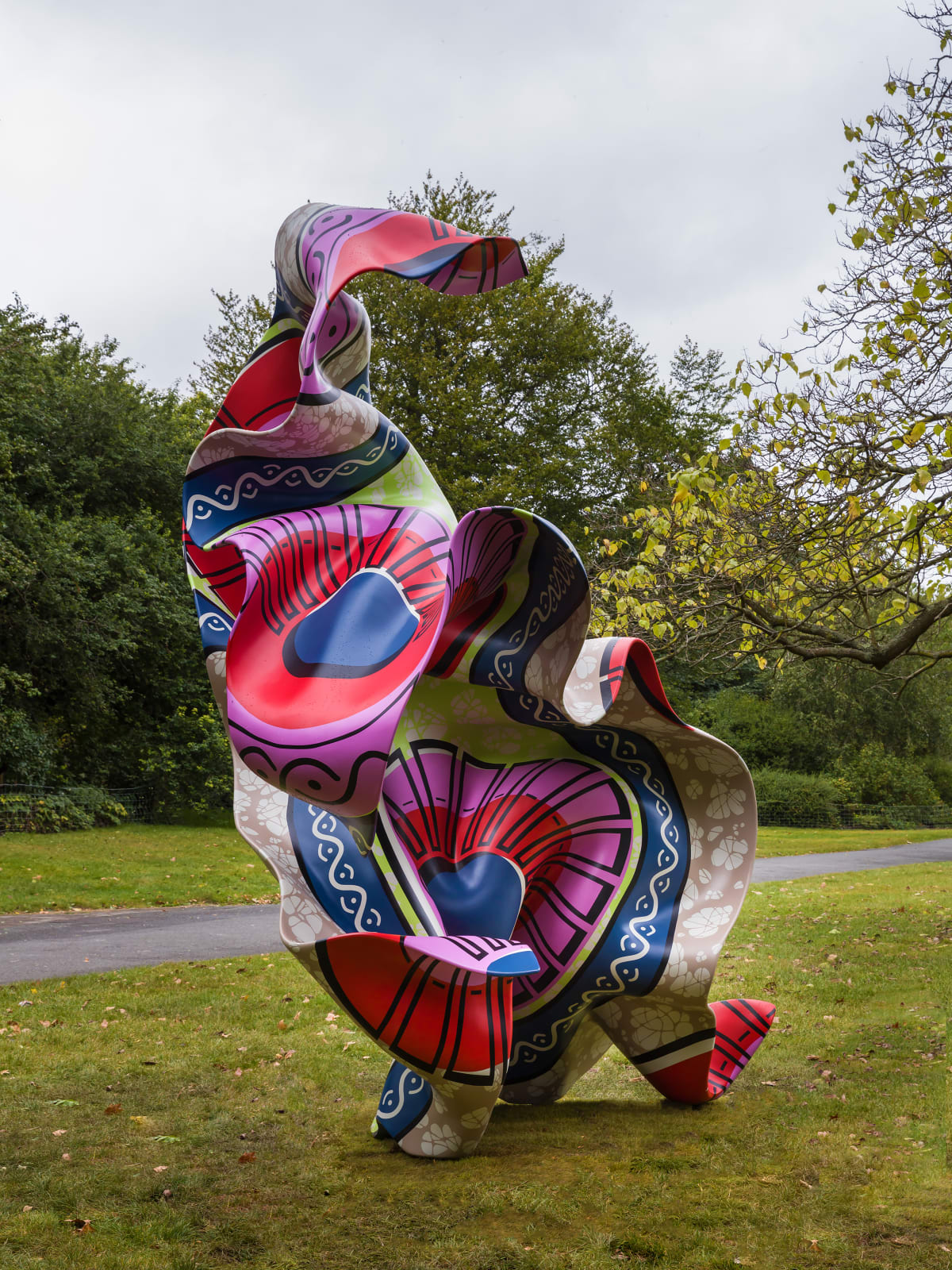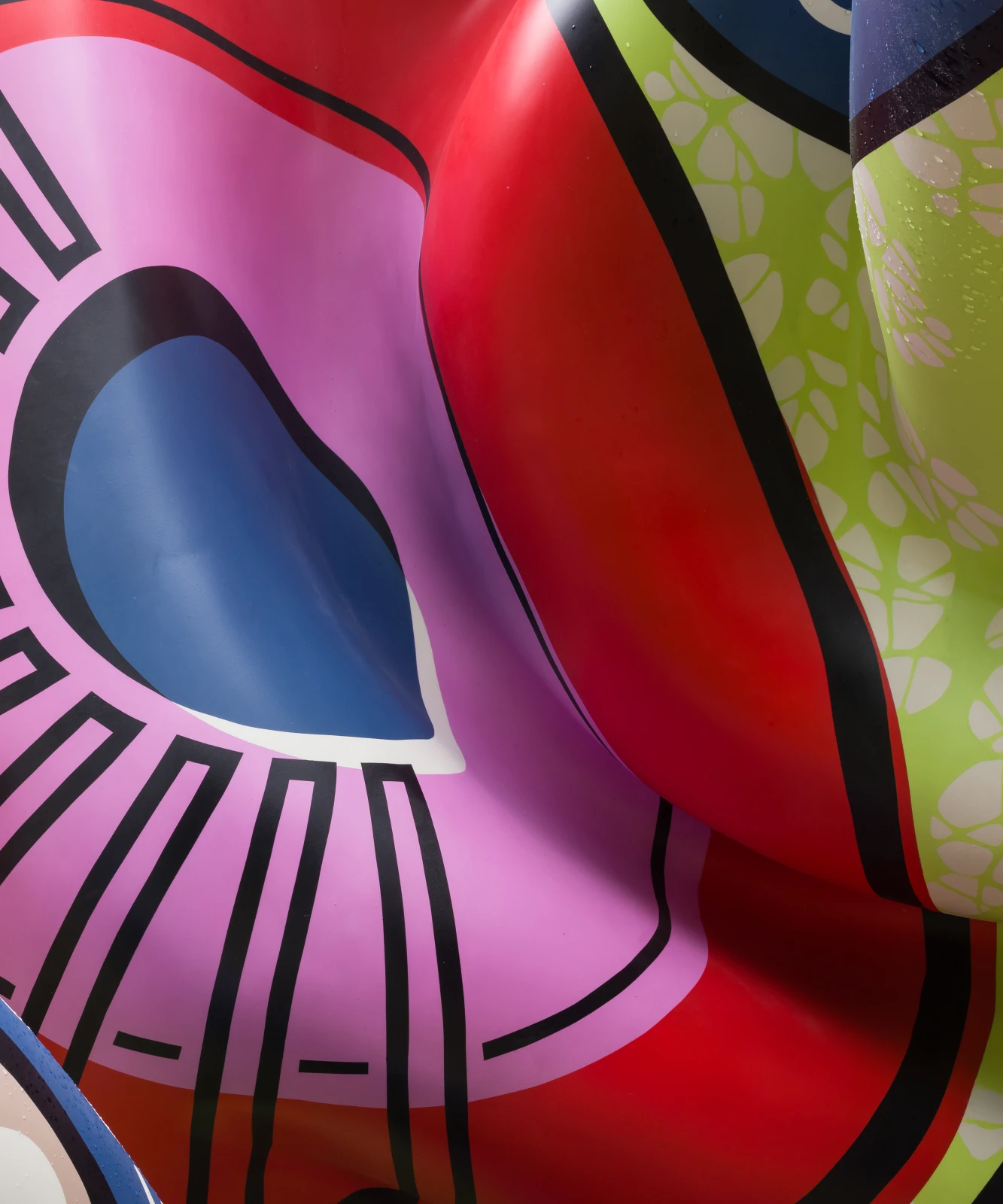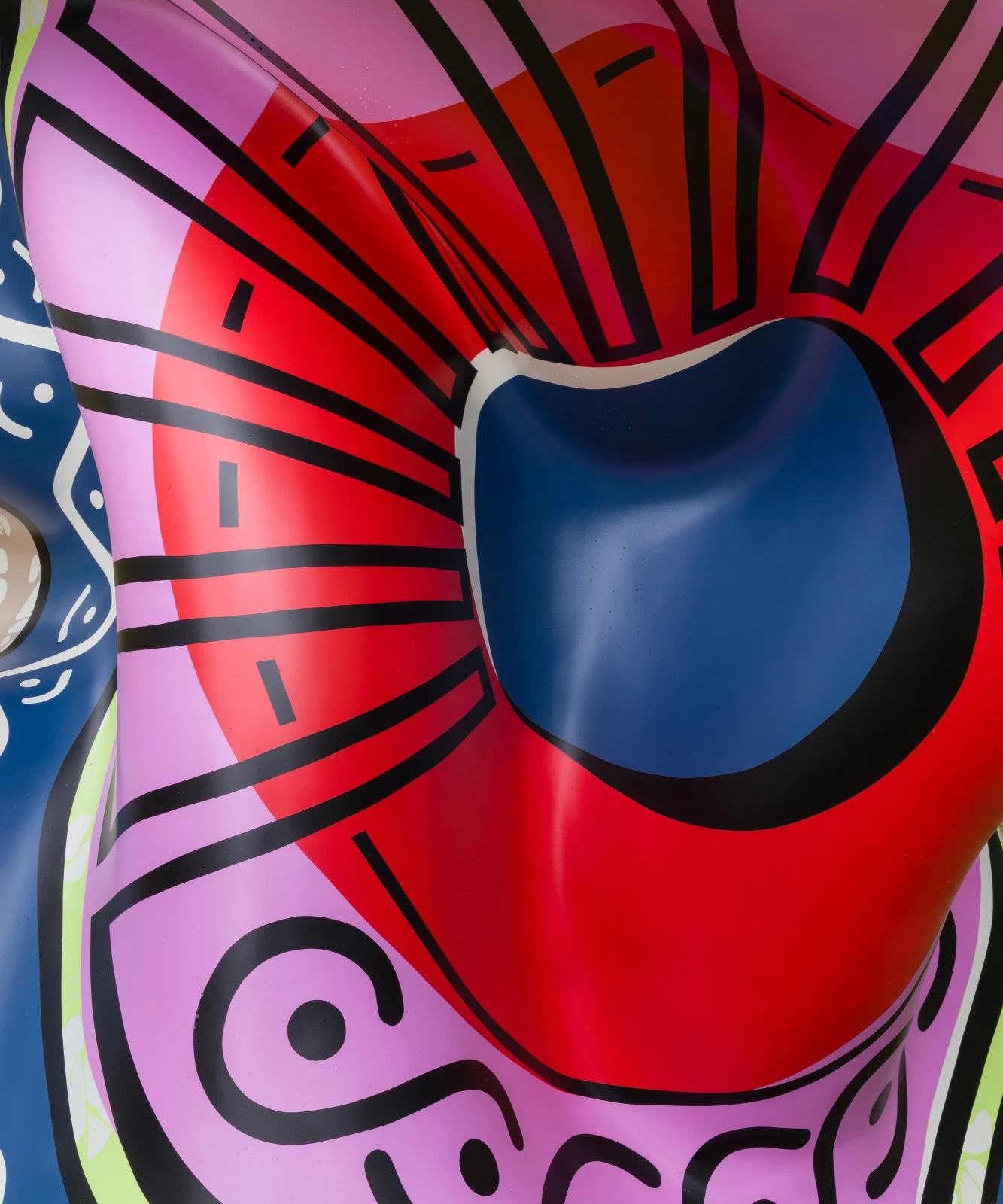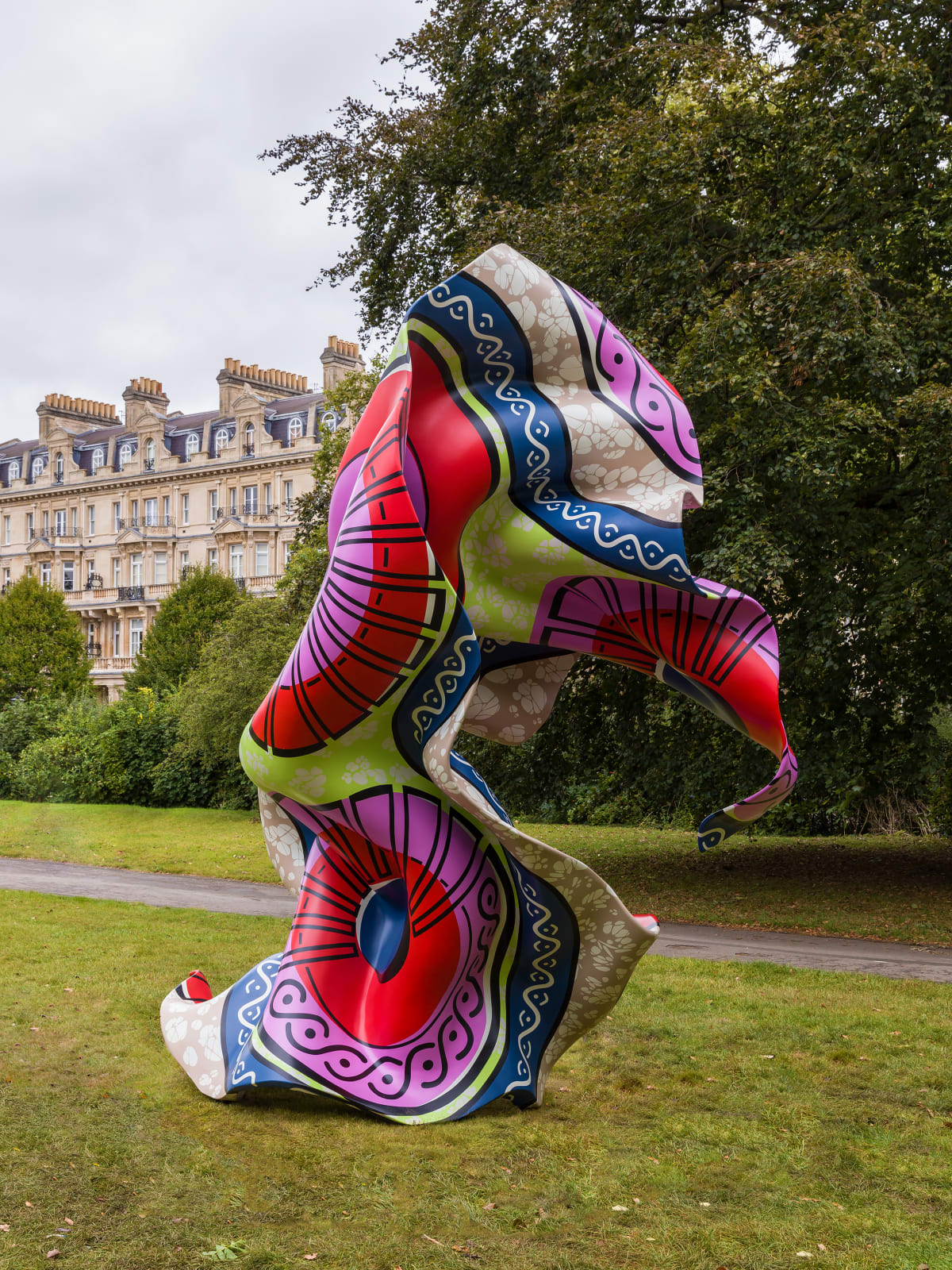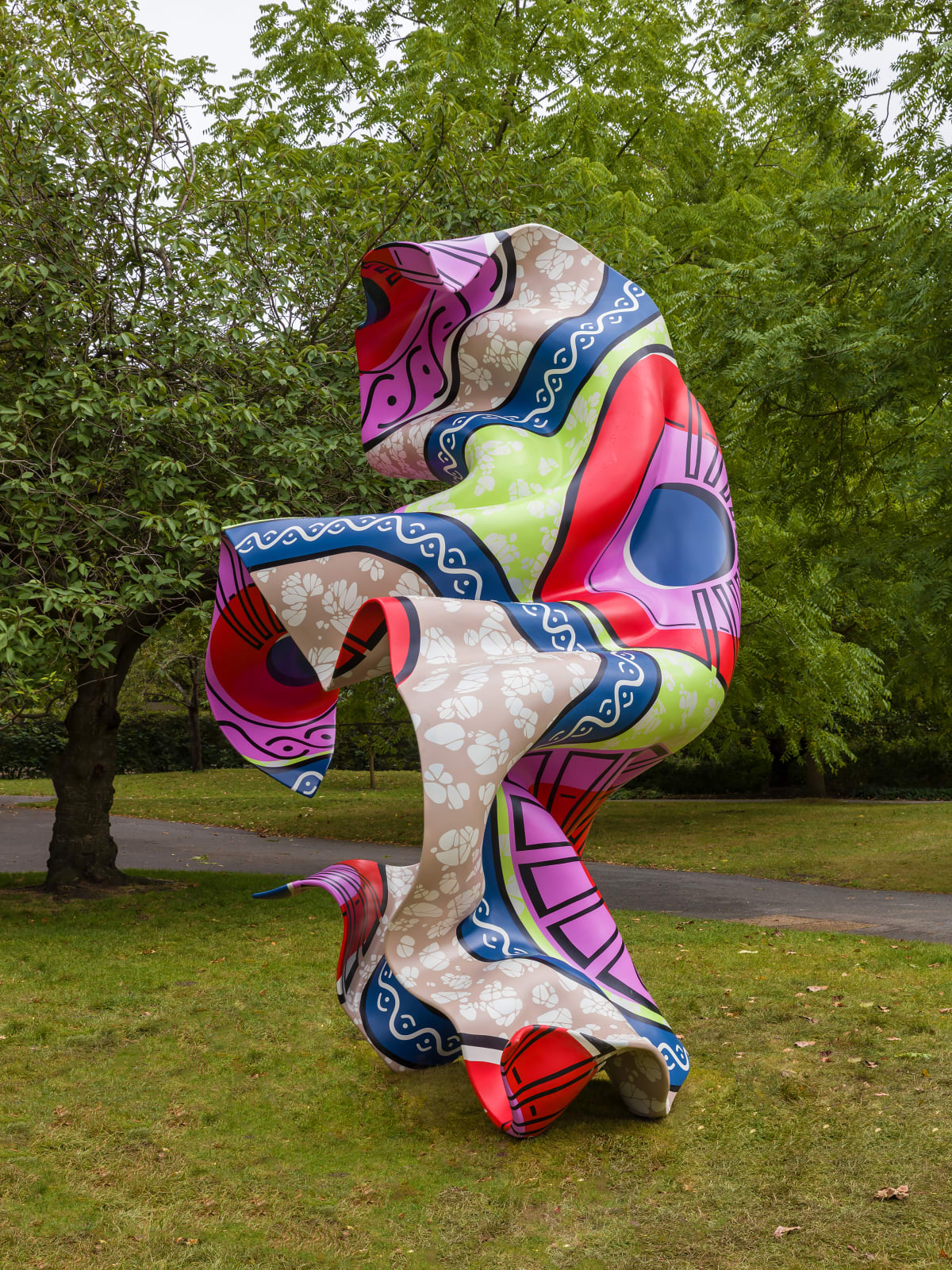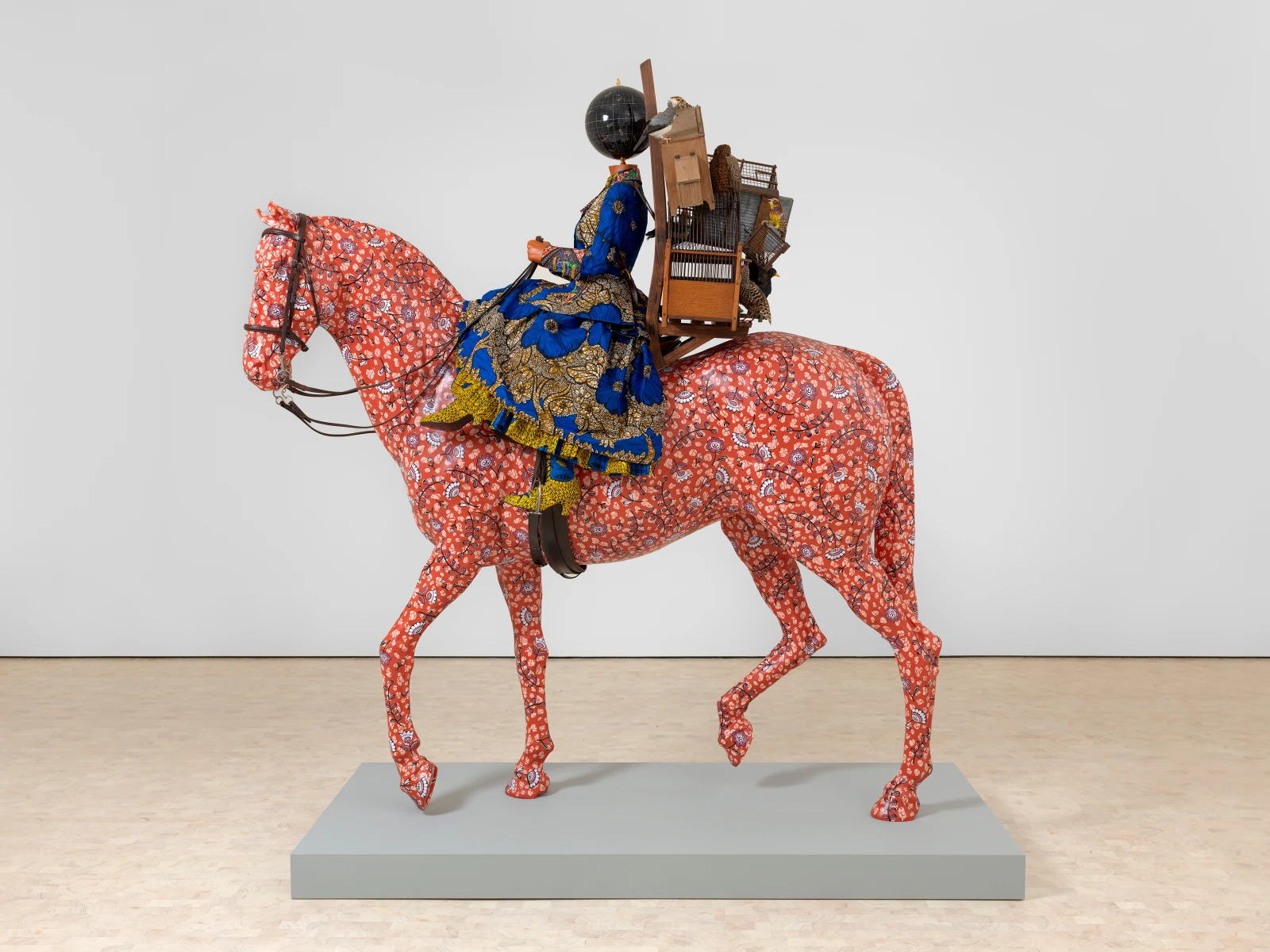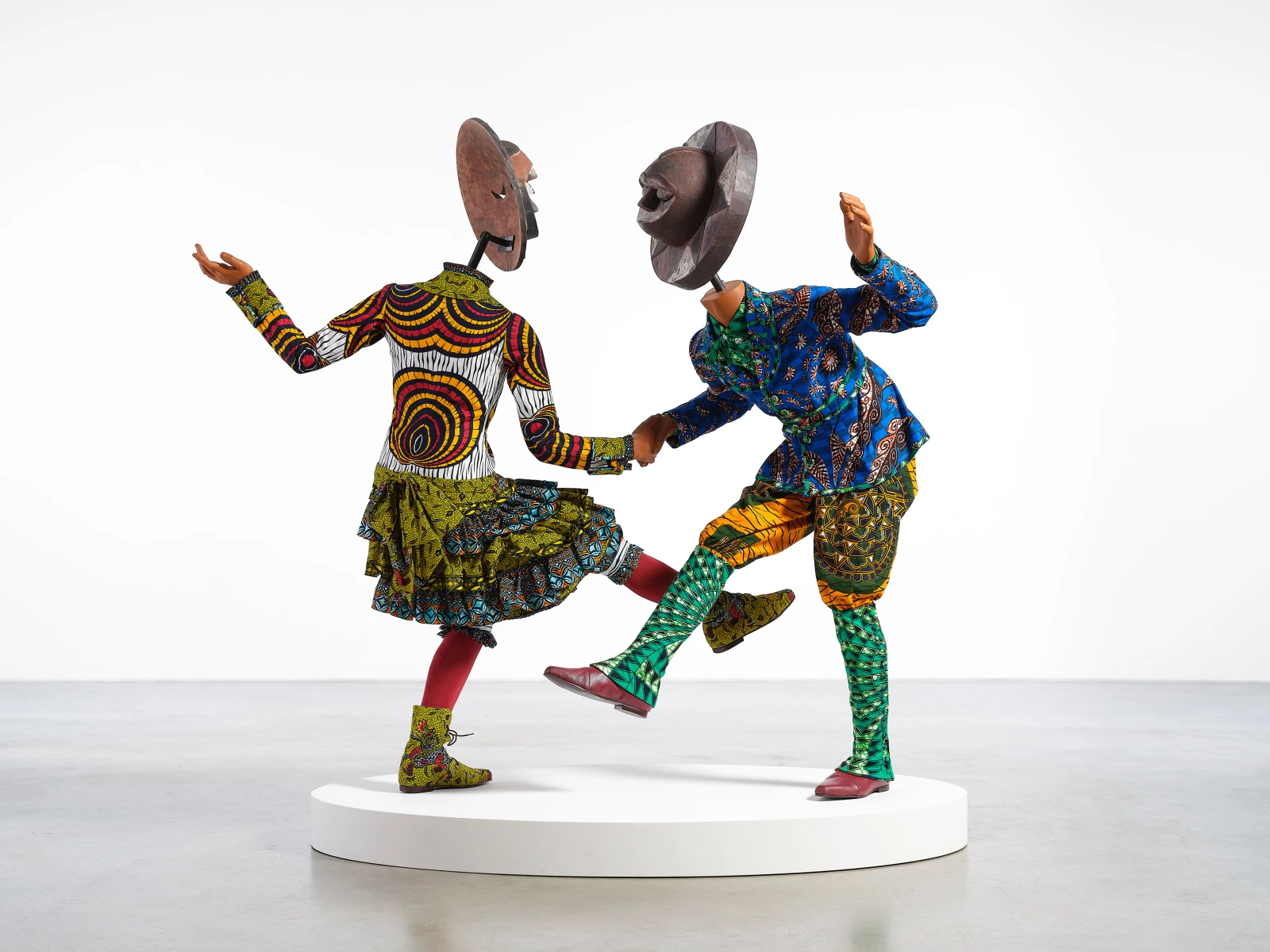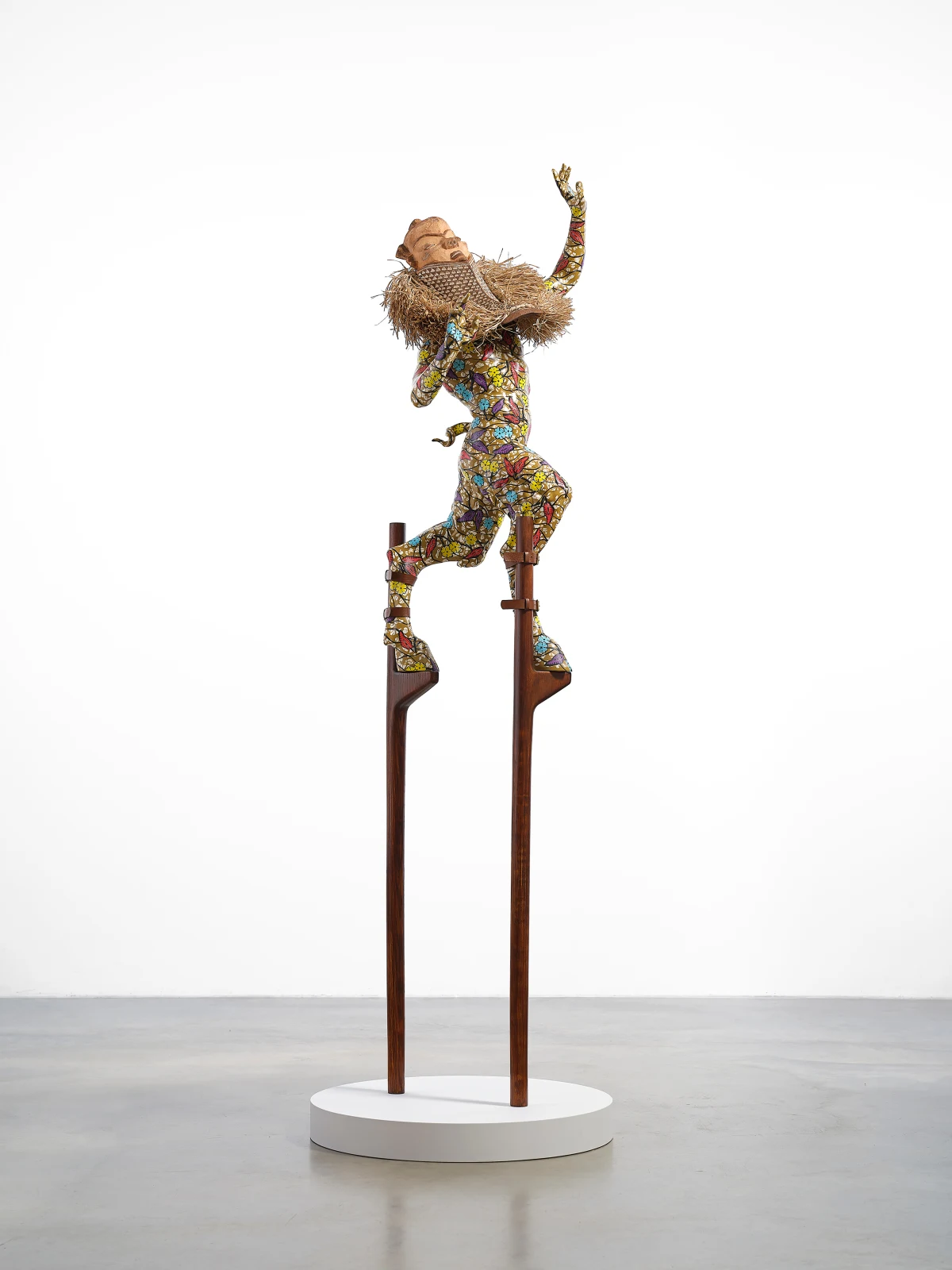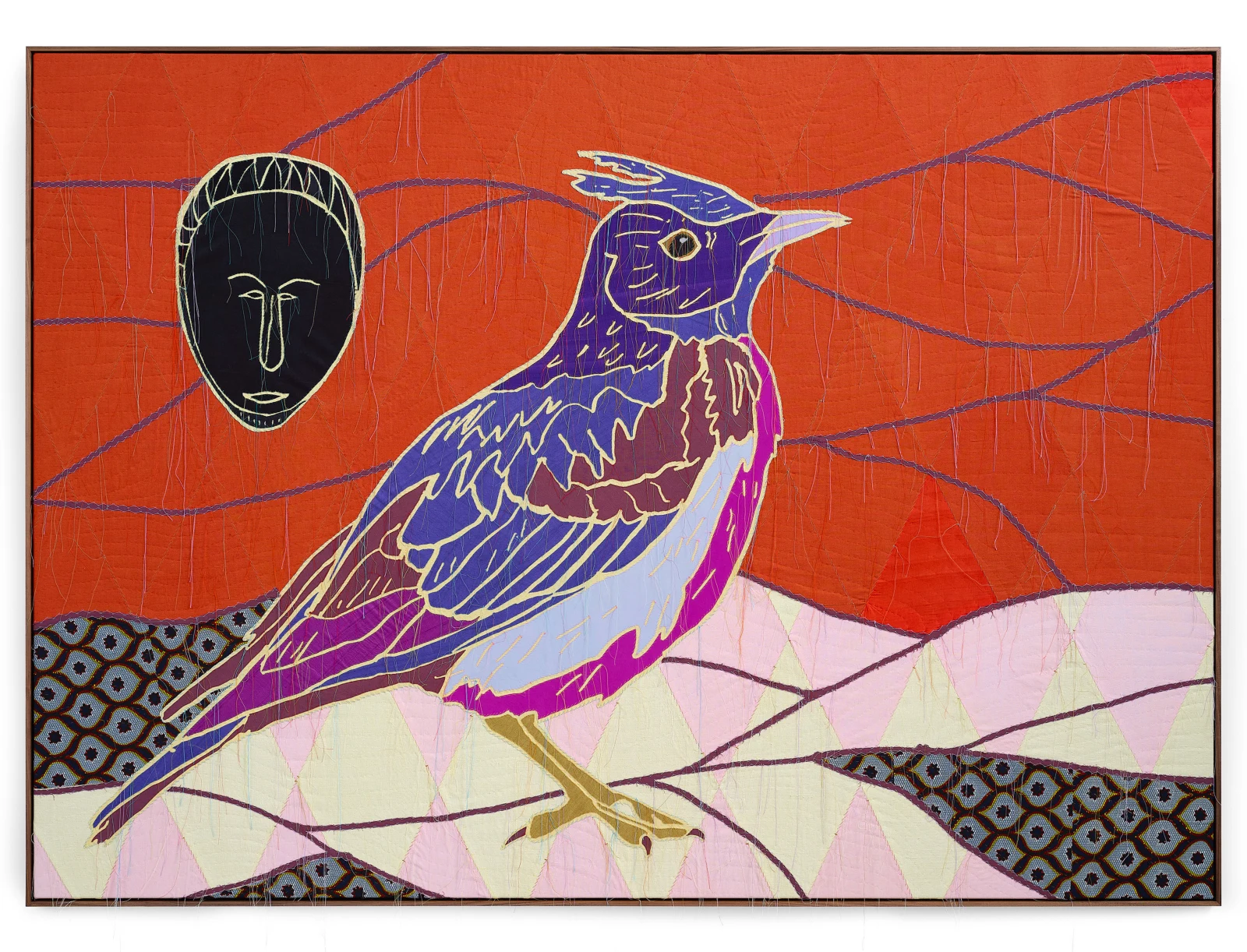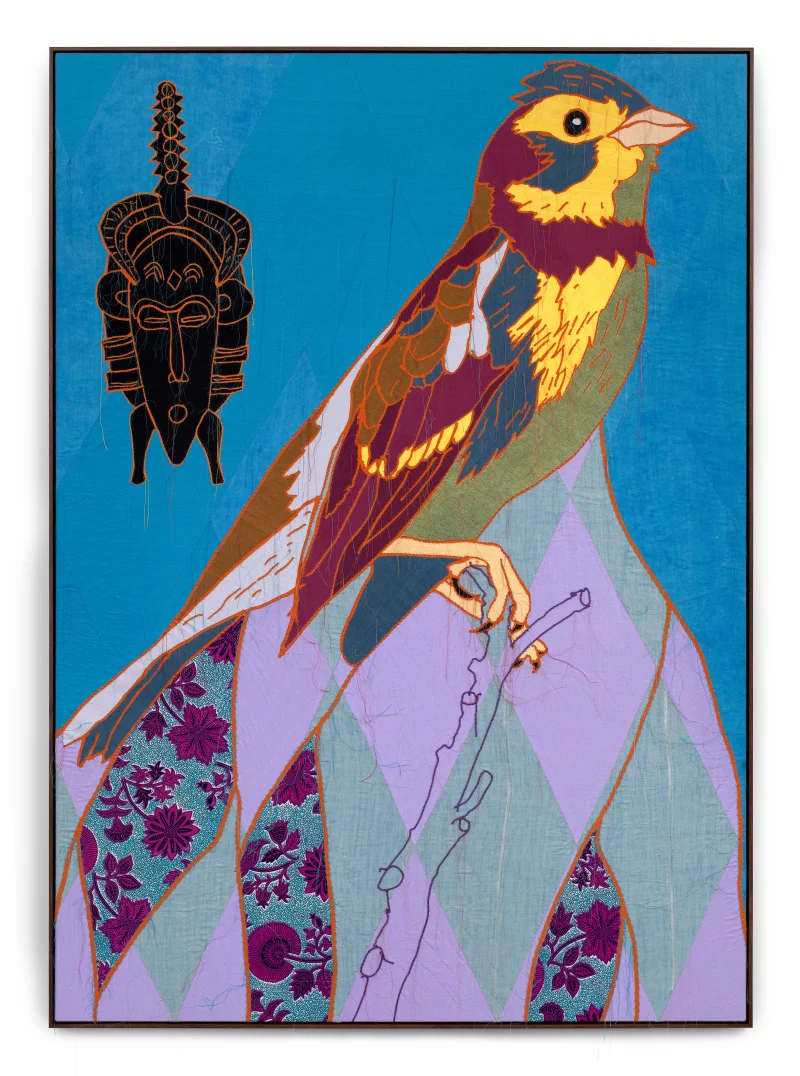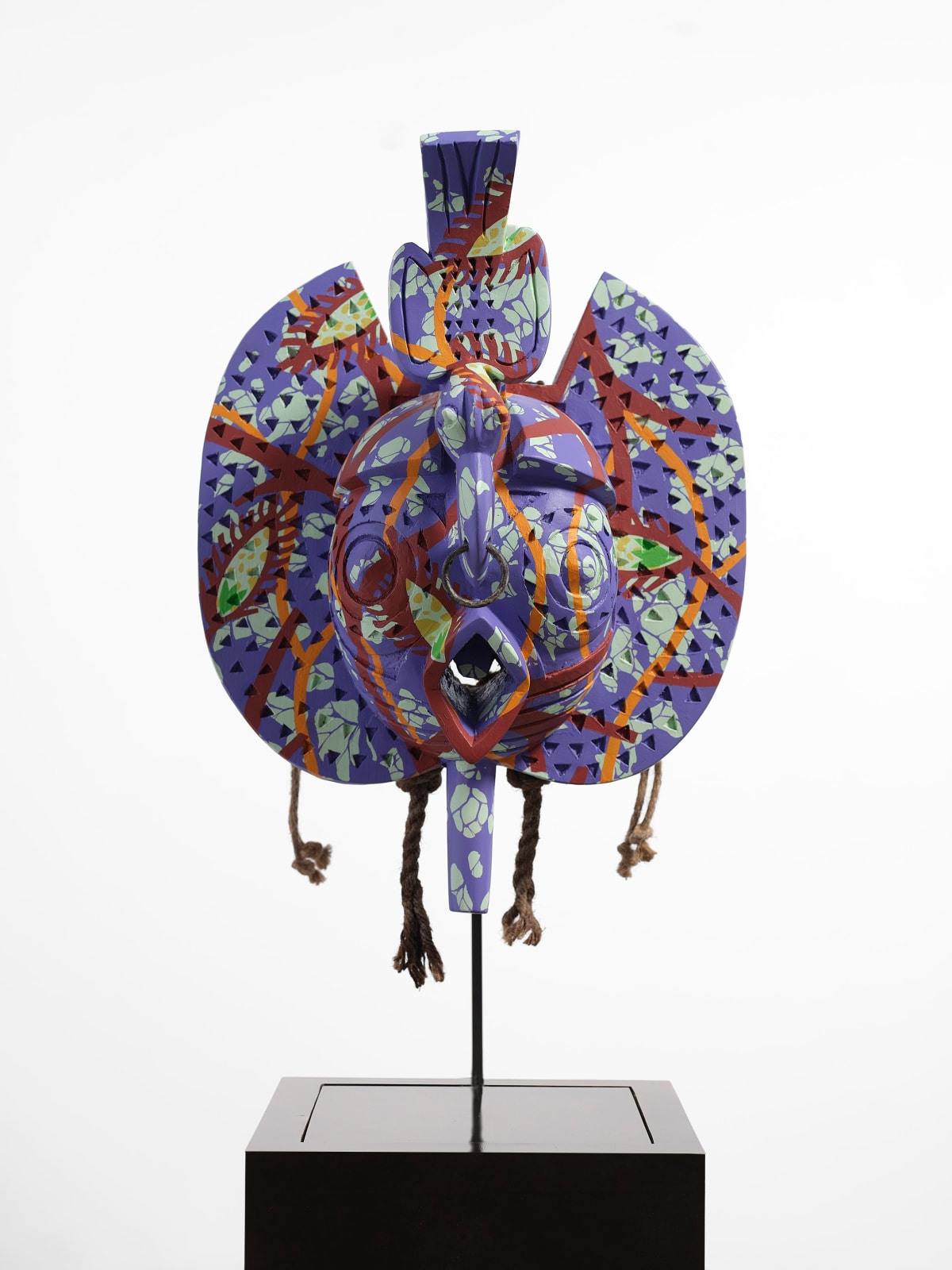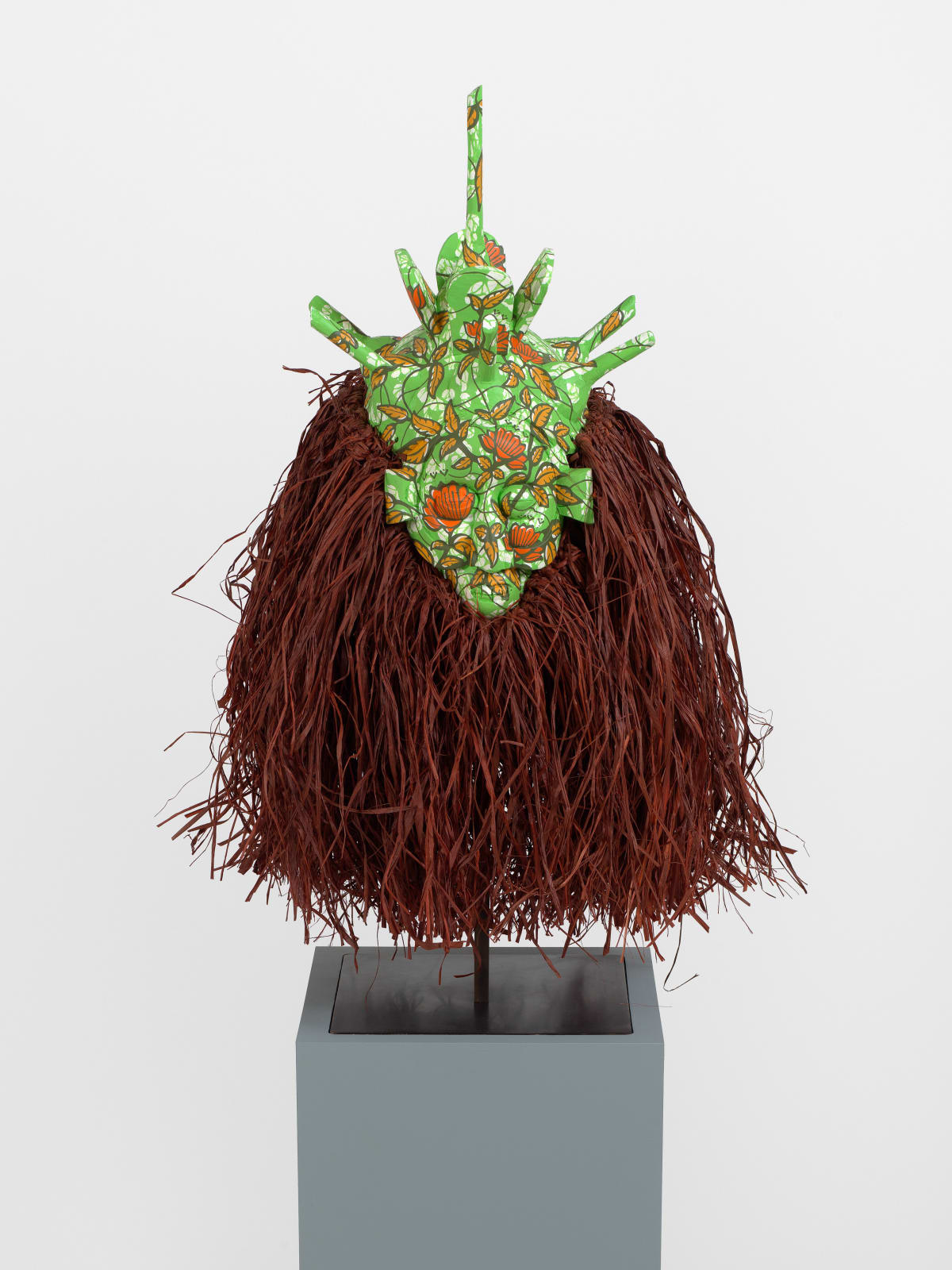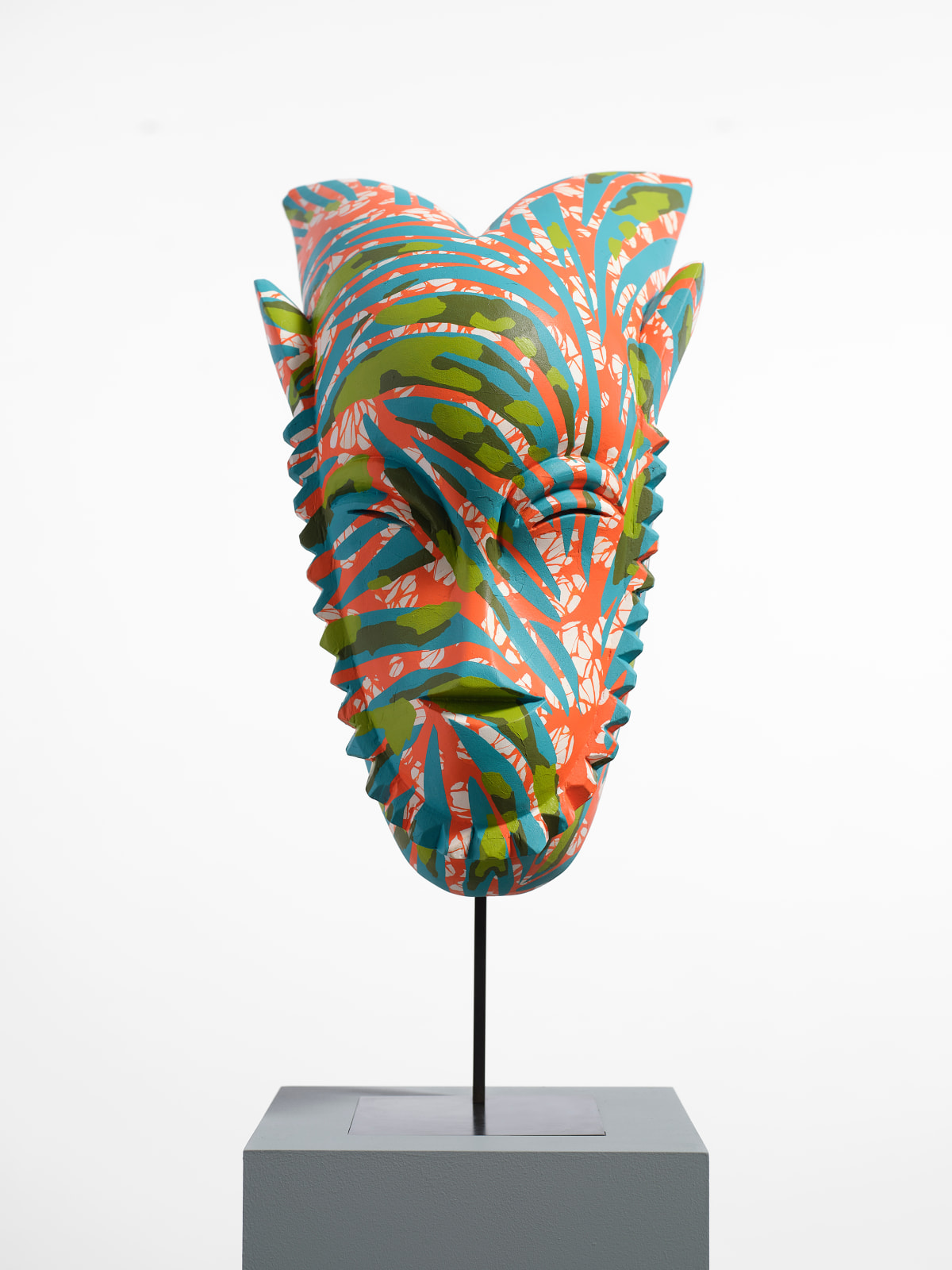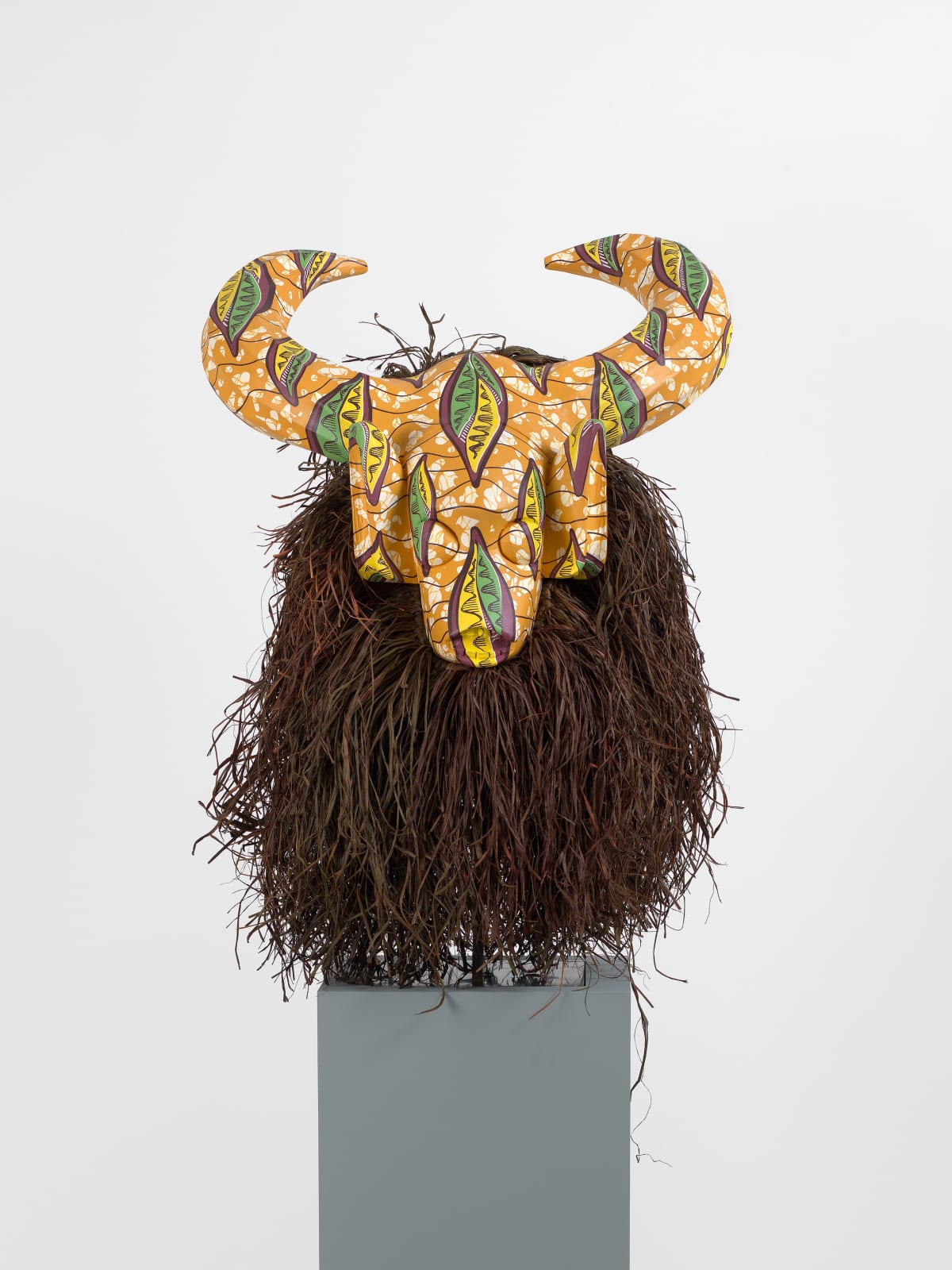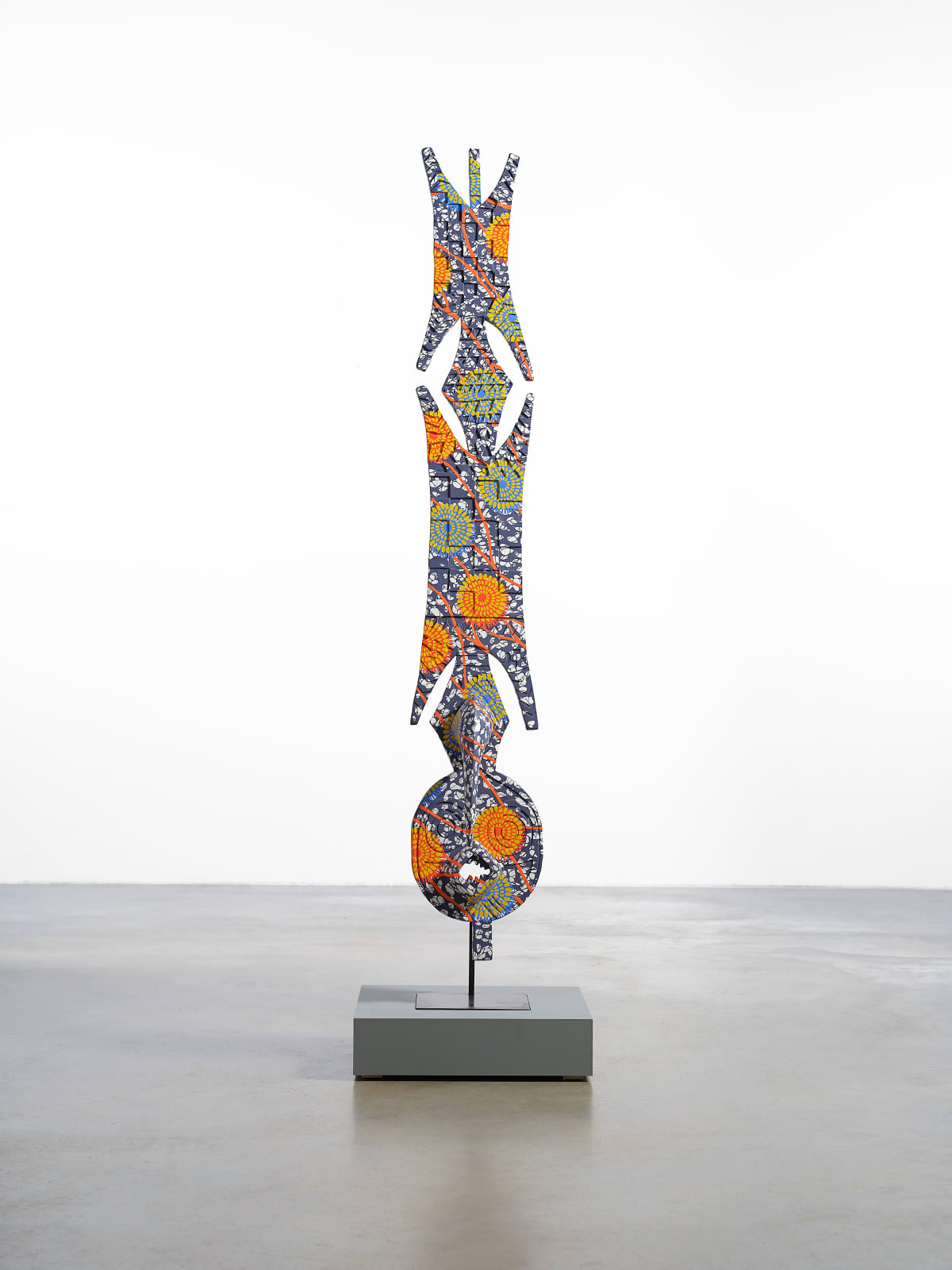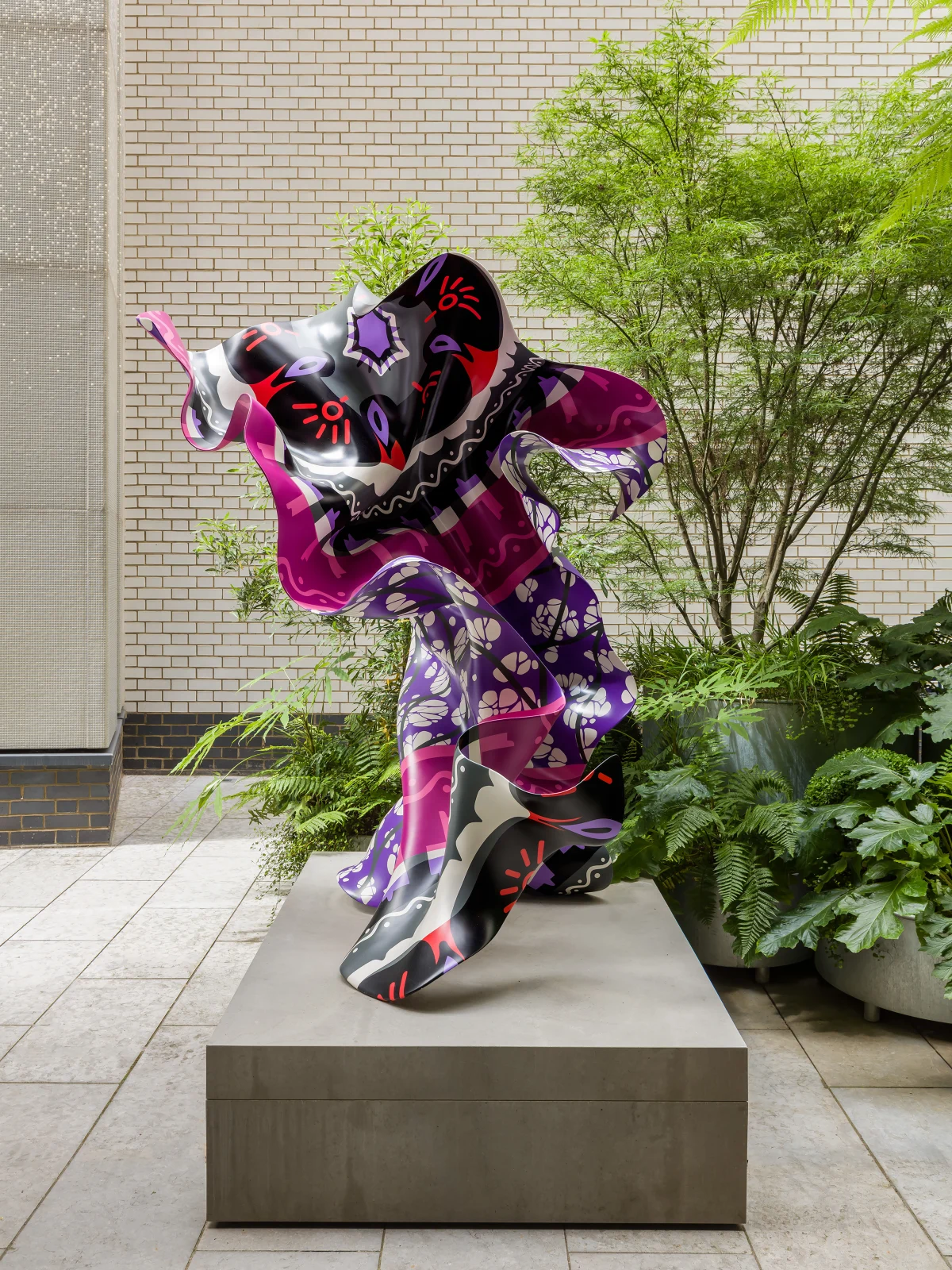Overview
Stephen Friedman Gallery is pleased to present two new projects in London by artist Yinka Shonibare CBE RA. Describing himself as a ‘post-colonial hybrid’, the British-Nigerian artist makes work that explores issues of race and class.
'Free the Wind, The Spirit and the Sun' is the inaugural exhibition at Stephen Friedman Gallery’s new London home on Cork Street in Mayfair. For this, Shonibare has created a new body of work including quilts, masks and sculptures.
A striking four-metre sculpture is presented for Frieze Sculpture at The Regent’s Park. Representing the freezing of wind in a moment of time, it resembles a vast sheet of fabric billowing in the breeze.

Yinka Shonibare on Material (SG) IV, 2023
‘Material (SG) IV’ captures the idea of harnessing the wind and freezing it in a moment of time. Imbued with a remarkable sense of dynamism, the sculpture resembles a vast sheet of fabric, billowing in the breeze.The work is a commanding alternative to conventional monuments of personal power, instead exploring universal experience of historical change. The sculpture was born out of the artist’s Fourth Plinth commission ‘Nelson’s Ship in a Bottle’ for London’s Trafalgar Square in 2010. Shonibare felt that the ship’s sails, emblazoned with his signature Dutch wax batik fabric, could stand alone. The fabric was originally inspired by Indonesian design, mass-produced by the Dutch and eventually sold to the colonies in West Africa. In the 1960s, the material became a signifier of African identity and independence. Adorned with this iconic design, the sculpture becomes a powerful metaphor for the movement of people and global interconnectivity over time. |


‘Free The Wind, The Spirit, and The Sun’ – a new exhibition by British-Nigerian artist Yinka Shonibare CBE RA – is the first to take place at Stephen Friedman Gallery's new London home on Cork Street, Mayfair. Having joined in 1996, Shonibare is one of the gallery’s longest represented artists.
Described as a “celebration of nature” by Shonibare, the first two rooms of the exhibition comprise a vibrant body of sculptures, masks and quilts. The show takes inspiration from the dada spirit; formed in Zurich during the First World War at Cabaret Voltaire by Hugo Ball and Emmy Hennings, the movement challenged the bourgeois values and traditions of Western art, from the Renaissance to naturalism and impressionism. Throughout the war, dada artists often staged performances in bewildered, trance-like states, evoking African and Oceanic cultures to express animalism, originality, and freedom.

‘Feeling Free Like a Bird’ by Yinka Shonibare CBE derives from a portrait of a privileged equestrian painted by fellow Royal Academician, George Stubbs, whose studies of the anatomy of animals brought him to naturalistic paintings of horses.
Fascinated by geographical and cultural identity, Shonibare layers multiple references in this sculpture. The figure’s bespoke, Victorian style costume is sewn with the artist’s trademark Dutch wax batik fabric. The hand-painted pattern on the horse is also inspired by the Indonesian-designed fabrics which were mass-produced by the Dutch and eventually sold to the colonies in West Africa. In the 1960s, the material became a signifier of African identity and independence and in Shonibare’s hands, the “perfect metaphor for multi-layered identities.” Adorned with this iconic design, 'Feeling Free Like a Bird’ becomes a powerful metaphor for the movement of people and global interconnectivity over time.

‘Sun Dance Kids (Boy and Girl)’ is a playful sculpture by British-Nigerian artist Yinka Shonibare CBE RA which depicts a young boy and girl standing in a dancer’s pose and dressed in Victorian costume. The figures’ heads are replaced by ‘Sun Masks’, hand-carved, wooden replicas of commercialised African masks. Symbolic of mother nature, similar imitations are marketed as objects used in harvest ceremonies.

This unique, classical sculpture stands on hand-carved and stained wooden stilts, transmuted through the Shonibare's signature batik patterns. The head of the figure is replaced with a replica of a Giwoyo mask that was worn during initiation ceremonies by the Pende peoples of the Democratic Republic of the Congo. Through reappropriating such artefacts, Shonibare reveals the roots of European Modernism in African aesthetics through the lens of his own Nigerian heritage and British art education. The idea of masking speaks to the performative, constructed nature of ethnic identity whilst pointing to Western societies’ superficial engagement with African culture.
Toying with notions of concealment and revelation, Shonibare obscures the playful form with vibrant batik style patterns. This fabric was originally inspired by Indonesian design, mass-produced by the Dutch and eventually sold to the colonies in West Africa. In the 1960s the material became a signifier of African independence. Here, batik challenges the ‘snobbish zeal’ with which colour and pattern have been dismissed in Eurocentric discourses. The design is not merely ornamental, but a means to express the British-Nigerian artist’s own status, as a ‘post-colonial hybrid’ and the global financial systems which shape notions of cultural identity.
"I started to think about the question of authenticity. What makes an artist an authentic artist? That's how I ended up in Brixton market, looking at the African textiles. And then I found out that actually, a fabric I always considered authentic had these Indonesian origins, are then produced by the Dutch and sold in West Africa. I thought that was fascinating, that the fabric is also about a relationship with Europe and Indonesia and Africa."
- Yinka Shonibare CBE RA

These textiles are part of a new body of work depicting critically endangered African bird species created by the British-Nigerian artist. Drawing on folk traditions of quilt making, the series is made using deadstock or second-hand fabrics sourced from local suppliers to minimise the environmental impact of textile production.
The seemingly whimsical becomes an expression of the desire to escape from a world faced with economic challenges and impending environmental catastrophes.


Shonibare’s ‘Hybrid Masks’ are a group of zoomorphic masks combining human and animal features that focus on the transformational qualities and spiritual meaning of masquerades in West African regions. They stem from ritualistic practices marking initiation and celebrating harvest and fertility. Dadaists considered these masquerades as a rejection of the whole of Western civilisation as well as an anti-war protest.
The works represents Yinka Shonibare CBE's incisive exploration of cultural identity within a post-colonial context. These striking sculpture are part of an ongoing body of works, in which Shonibare reimagines African masks from collections of early Modernists, transfigured through his signature batik style patterns. This brightly painted example depicts the face of a young woman who embodies the qualities of ideal beauty amongst the Guro people of Côte d'Ivoire.
Through reappropriating such artefacts, Shonibare reveals the roots of European Modernism in African aesthetics through the lens of his own Nigerian heritage and British art education. The idea of masking speaks to the performative, constructed nature of ethnic identity whilst pointing to Western societies’ superficial engagement with African culture. Re-contextualised within the language of contemporary art, the sculpture invites parallels between the double-edged ‘negrophilia’ of 1920s Paris, as well as the appreciation and appropriation of Black culture today.

'Wind Sculpture in Bronze (SG) I' by Yinka Shonibare CBE RA captures the idea of harnessing the wind, with the sculpture resembling a vast sheet of fabric, billowing in the breeze. Imbued with a remarkable sense of dynamism, the sculpture embodies the movement of wind as if it is about to dance or move away.
The work is a commanding alternative to conventional monuments of personal power, instead exploring universal experience of historical change. The sculpture was born out of the artist’s Fourth Plinth commission ‘Nelson’s Ship in a Bottle’ for London’s Trafalgar Square in 2010. Shonibare felt that the ship’s sails, emblazoned with his signature Dutch wax batik fabric, could stand alone.

Shonibare on his Wind Sculpture Series:
“The idea is to produce something which is hard but to make it look soft, and weightless. The Wind Sculpture series was actually inspired by a project I did in Trafalgar Square; Nelson’ Ship in a Bottle. [...] I like the relationship between the different cultures, as the fabric is a metaphor for the movement of people and global relationships.”
Podcast: A brush with... Yinka Shonibare

Artist Biography
Yinka Shonibare CBE RA was born in 1962 in London, England and moved to Lagos, Nigeria at the age of three. He lives and works in London. Shonibare was a Turner Prize nominee in 2004 and was elected as a Royal Academician by the Royal Academy, London in 2013. He was awarded the decoration of Most Excellent Order of the British Empire or MBE in 2004 and Commander of the Most Excellent Order of the British Empire or CBE in 2019. Shonibare received the prestigious Art Icon Award from Whitechapel Gallery, London and an honorary degree from The Courtauld Institute, London in 2021.
Shonibare’s practice questions the meaning of cultural and national definitions. His signature material is the brightly coloured ‘African’ batik fabric he buys at Brixton market in London. Batik was originally inspired by Indonesian design, mass-produced by the Dutch and eventually sold to the colonies in West Africa. In the 1960s the material became a signifier of African identity and independence.
